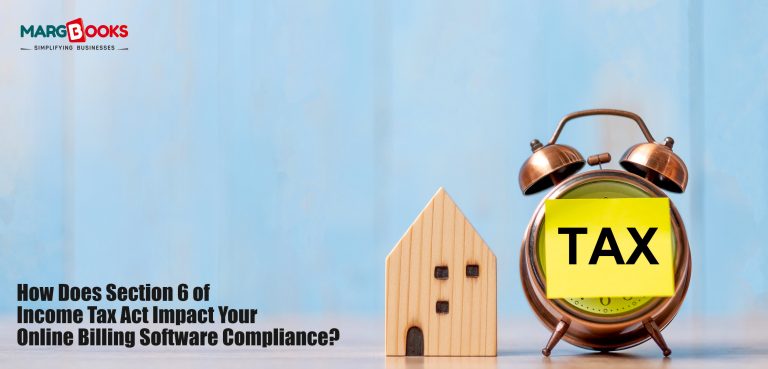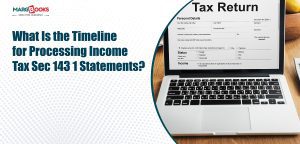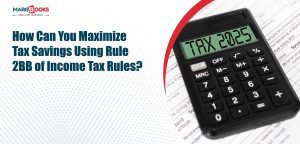In today’s fast-paced digital economy, businesses—especially SMEs—are moving towards digitizing their invoicing and compliance processes. From GST to TDS, everything now needs to be filed electronically, and this has made Online Billing Software a crucial tool for every business. But did you know that even Section 6 of the Income Tax Act can influence how your software and billing system should function?
Whether you run a physical store or manage an additional place of business in GST, understanding Section 6 can help you stay compliant and avoid unwanted scrutiny from the Income Tax Department. In this post, we’ll decide what Section 6 of the Income Tax Act really means, how it impacts your billing software, and why it’s time to integrate smarter platforms like MargBooks.
Understanding Section 6 of the Income Tax Act
Section 6 of the Income Tax Act, 1961, primarily deals with the residential status of an individual or a business entity. You might wonder—how does that connect to billing software?
Here’s the thing: residential status determines how you are taxed in India. If your business or its control and management is wholly or partly in India, then your income—global or domestic—might be taxed here. That’s where accurate, timely, and transparent invoicing becomes critical. Because if your billing software is not aligned with your residential status and accounting requirements, it can lead to errors in tax computation and non-compliance.
Why Does This Matter for Your Business?
Let’s connect the dots. When the Income Tax Department evaluates your business, they often check:
- Source of income
- Nature of transactions
- Residential status (under Section 6)
- GST compliance
- Invoicing and billing records
If your business has multiple locations or an additional place of business in GST, it becomes even more important to centralize all these records. A scattered invoicing system can lead to inconsistencies, duplicate transactions, or missed filings.
So, the takeaway? Section 6 of Income Tax Act doesn’t just sit in isolation. It’s interconnected with GST laws, billing data, and business transparency. That’s why the tool you use—your Online Billing Software—should be robust enough to keep up.
Keyways Section 6 Affects Your Billing Software Compliance
Here are some tangible ways Section 6 can influence your choice and use of online billing software:
1. Centralized Control of Multiple Business Locations
If you have an additional place of business in GST, your software must be able to:
- Handle multiple GSTINs
- Consolidate records across all branches
- Generate location-wise reports
- File accurate GST returns branch-wise
2. Error-Free Data for Tax Filings
When determining residential status, tax officers may request financial documents, including invoices and transaction summaries. If your billing software has gaps, errors, or discrepancies, it can raise red flags.
3. Automated Tax Calculations Based on Location
Your tax liability could vary depending on whether income is considered earned in India or abroad. Hence, software that can integrate with GST and Income Tax systems is vital.
Choosing the Right Online Billing Software: Why MargBooks?
Now that you know what’s at stake, let’s talk solutions. MargBooks is one of the few online billing software platforms designed keeping Indian compliance in mind—including GST, TDS, and Income Tax requirements.
Key Features of MargBooks:
- Multi-location support: Ideal for businesses with an additional place of business in GST.
- Integrated GST compliance: Auto-calculation of GST, GSTR reports, and e-invoicing.
- Cloud-based access: Operate from anywhere, anytime.
- Real-time data sync: Ensures all branches reflect updated records.
- CA-friendly reports: Makes audit and tax filings easy.
Whether you’re a startup or an established business, MargBooks keeps your invoicing and compliance in perfect sync.
Real-Life Example: How Section 6 and GST Interplay
Let’s say you run a garments store in Pune and open another outlet in Nashik. As per GST norms, Nashik becomes your additional place of business in GST. However, as your operations are expanding, the Income Tax Department might assess your residential status more stringently.
If your software cannot consolidate and clearly present income from both outlets, it may appear as undisclosed income—or worse, tax evasion. Using MargBooks in this scenario means your entire operation—Pune and Nashik—is tracked, compliant, and easily auditable.
Final Thoughts
In the compliance-heavy world of Indian taxation, no law works in isolation. Section 6 of the Income Tax Act might seem like a simple classification of residential status, but it has a domino effect on how you manage billing, report income, and maintain transparency.
This is where using a smart, India-centric Online Billing Software like MargBooks can be a game-changer. From GST integration to income tax-friendly reports, it simplifies your workload and keeps you on the right side of the law—especially if you operate across multiple locations or have an additional place of business in GST.
So, don’t just focus on filing your taxes. Focus on building a system that supports it from the ground up.




